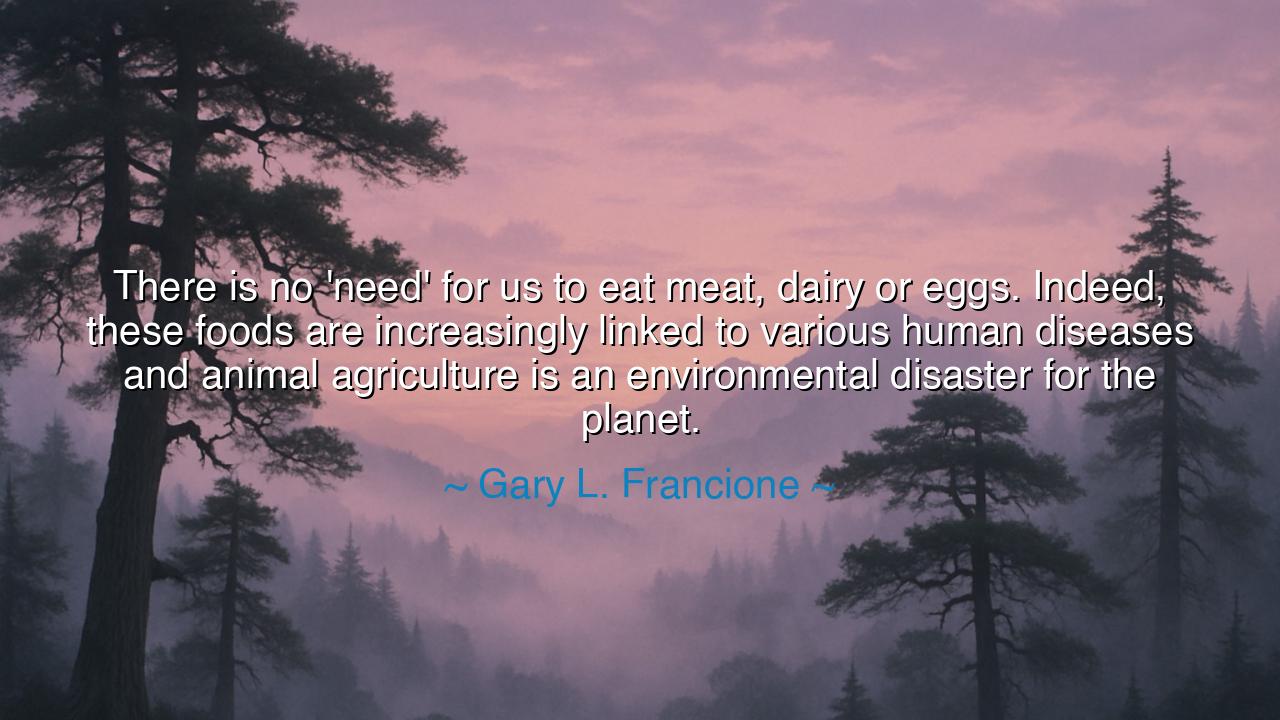
There is no 'need' for us to eat meat, dairy or eggs. Indeed
There is no 'need' for us to eat meat, dairy or eggs. Indeed, these foods are increasingly linked to various human diseases and animal agriculture is an environmental disaster for the planet.






Gary L. Francione, voice of compassion and reason, once declared with unflinching clarity: “There is no ‘need’ for us to eat meat, dairy or eggs. Indeed, these foods are increasingly linked to various human diseases and animal agriculture is an environmental disaster for the planet.” In this utterance, he speaks not only of diet, but of destiny. His words resound like a trumpet in the valley, calling humankind to awaken from ancient habits, to see that necessity is not what binds us, but choice.
The meaning of this quote lies in the breaking of illusion. For countless generations, men have believed that to live they must kill, that strength depends on flesh, that survival requires the suffering of others. Francione tears the veil, declaring that the supposed need is false, and that abundance can be found in plants, grains, and fruits of the earth. He reminds us that clinging to outdated beliefs in the face of knowledge is folly, and that wisdom calls us to adapt when truth reveals a new path. To eat meat, dairy, and eggs is not necessity but tradition, and tradition must bow before justice when the cost is too high.
The origin of this cry arises from Francione’s lifelong advocacy for animal rights. As a scholar and activist, he looked upon the vast machinery of animal agriculture and saw the suffering it inflicted—on the creatures confined and slaughtered, on the people stricken with diet-related diseases, and on the very earth itself, wounded by deforestation, pollution, and climate change. His words are both lament and summons: lament for what has been, summons for what must be.
History itself offers witness. Consider the story of the Dust Bowl in America during the 1930s. Though not born of animal agriculture alone, it revealed how misuse of the land, driven by short-sighted practices, can devastate entire regions. The soil turned to dust, crops failed, families fled, and hunger spread. Now imagine this same principle magnified: vast tracts of forest cleared to feed cattle, rivers poisoned by runoff, air thickened with methane. Francione’s warning is not fantasy, but a reflection of a cycle long repeated—that reckless exploitation of the land leads to ruin.
There is also a deeply emotional current in his words. To speak of disease and disaster is to speak of the fragility of life itself. The foods we raise upon the suffering of animals now rise against us, sowing illness in our bodies, even as the planet groans beneath the weight of our appetites. The very things that were once symbols of wealth and abundance are revealed as sources of harm. His declaration is thus not only about compassion for animals, but about compassion for ourselves, our children, and the earth that bears us.
To future generations, Francione’s words sound as both warning and hope. The warning is clear: if humanity continues along the path of industrial animal agriculture, the consequences will be disease, famine, and the degradation of the planet itself. The hope is equally clear: we are not bound by this path. We can choose differently. We can nourish ourselves without cruelty, thrive without destruction, and build a world where the bounty of the earth is shared without bloodshed.
The lesson is this: do not mistake habit for necessity. Question the practices handed down to you, and measure them against truth, compassion, and sustainability. Practically, this means embracing plant-based foods, supporting sustainable agriculture, and rejecting the falsehood that suffering is required for survival. It means seeing every meal as an act of ethics, every choice as a seed sown in the soil of the future.
Thus Francione’s words ring with the gravity of prophecy: “There is no ‘need’ for us to eat meat, dairy or eggs... animal agriculture is an environmental disaster for the planet.” Let all who hear this teaching remember: the fate of the earth is written not only in laws and battles, but in the daily choices of its people. To eat with wisdom is to live with justice. And to live with justice is to ensure that future generations inherit a world still green, still breathing, still alive.






AAdministratorAdministrator
Welcome, honored guests. Please leave a comment, we will respond soon